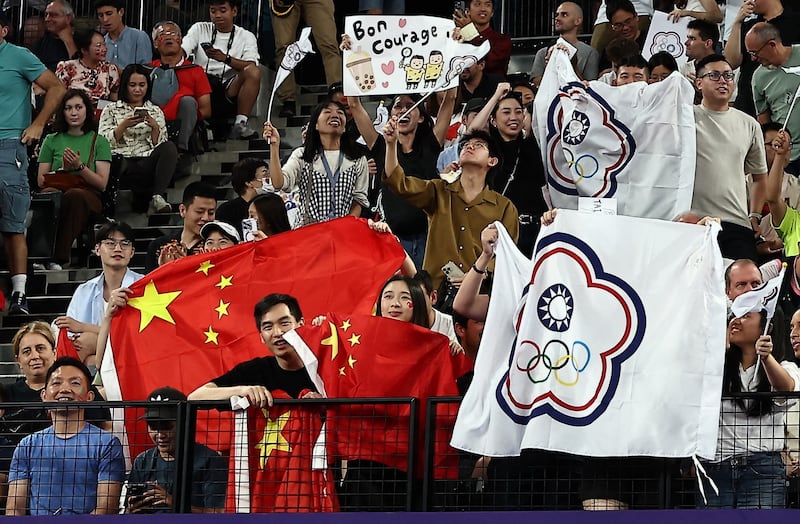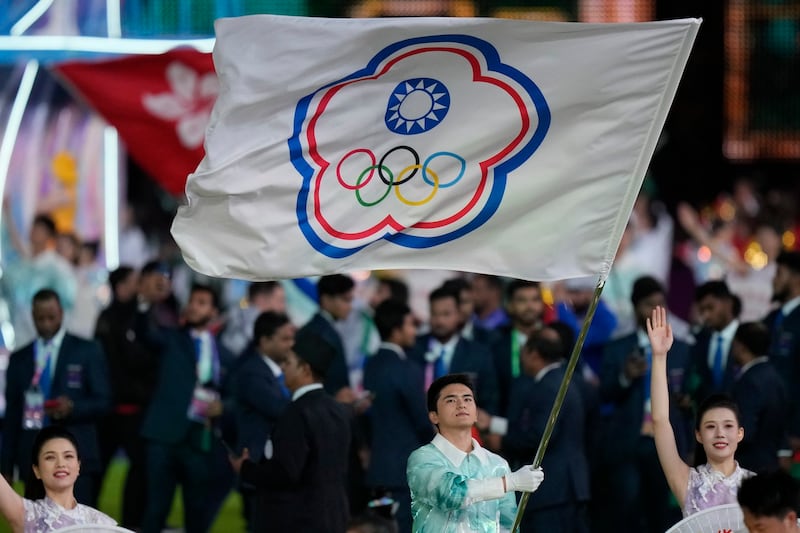If you’re watching the Paris 2024 Paralympic Games and wondering what or where “Chinese Taipei” is, you’re not alone.
More than 10 athletes from Taiwan are competing in the games, but they aren’t being introduced as coming from Taiwan.
Instead, they are represented as being from “Chinese Taipei.”
This isn’t just the case at the Paralympics or Olympics – it happens at all major international sporting events. Taiwan’s athletes are not allowed to compete under the Taiwanese flag. Here is why.
What is ‘Chinese Taipei’?
“Chinese Taipei” is the name Taiwan agreed upon with the International Olympic Committee, or IOC, in 1981 to participate in the Olympic Games.
Instead of Taiwan’s red and blue flag, Taiwanese athletes compete under the “Plum Blossom Banner,” a white flag that carries the Olympic rings.
A traditional flag-raising song, not Taiwan’s national anthem, is played when its athletes are on the podium.
This allows Taiwan to compete without presenting itself as a sovereign nation.

Why not ‘Taiwan’?
Taiwan, or the Republic of China, is not diplomatically recognized by most countries despite being a self-ruled democracy of 23 million people with its own borders, currency and government.
This dates back to 1949, when Taiwan and the People’s Republic of China disagreed over which government was the rightful “China.”
After the Chinese Civil War ended in 1949, the Nationalist government fled to Taiwan, while Mao Zedong’s communist forces established the People’s Republic of China on the mainland.
According to Beijing’s communist leadership, there is only “One China,” meaning Taiwan is considered part of it and must eventually be reunified with the mainland, by force if necessary.
In Beijing’s view, as a breakaway province, Taiwan does not have the right to state-to-state relations or to be treated as a state on the international stage.
As part of its efforts to isolate Taiwan, Beijing prevents the island from using the name “Taiwan” in international events.
Why ‘Chinese Taipei’?
The dispute over Taiwan’s name at international sports events began in 1952 when both Taiwan and China were invited to the Olympics.
At that time, both governments claimed to represent China, leading Taiwan to withdraw from the Games.
In 1956, Taiwan participated under the name “Formosa-China,” but Beijing boycotted those Games and withdrew from the IOC two years later.
During the 1960s, Taiwan competed under the name “Taiwan” at the request of the IOC. However, Taiwan’s government at the time objected, insisting on being called the Republic of China, or ROC.
By the 1970s, more countries were diplomatically recognizing Beijing instead of Taiwan.
In 1972, Taiwan participated in the Olympics as the ROC for the last time. Taiwan then boycotted the 1976 Games after host country Canada insisted it compete under the name Taiwan rather than ROC.
In 1979, Taiwan was suspended from the Olympics after the IOC recognized Beijing as the representative for China.
Two years later, Taiwan was allowed back into the Games after agreeing to compete under the name “Chinese Taipei,” which it has used ever since.

Back to Taiwan?
There are now growing calls to use the name Taiwan at the Games once again as relations between Taiwan and China are at a low point.
The Formosan Association for Public Affairs, U.S.-based nonprofit organization that seeks to build worldwide support for Taiwan independence, urged the IOC in early August to allow Taiwan’s team to compete under the name “Taiwan” rather than “Chinese Taipei”.
“Taiwan is an independent, sovereign country, and this is a long-established ‘status quo’,” the association’s president said in a statement, adding that Taiwan’s Olympic team was “fully entitled to compete proudly under the name ‘Taiwan’.”
A referendum on whether “Chinese Taipei” should be changed was held in Taiwan in 2018, although “Taiwan” lost, partly because top athletes opposed the change, fearful of being banned from major sports events.
China has dialed up diplomatic and economic pressure on the island since former president Tsai Ing-wen’s administration came to power in 2016, as Tsai and her party refused to acknowledge that Taiwan and the mainland belonged to “One China.”
President of Taiwan, Lai Ching-te, who came to power after winning a January election despite Beijing’s fierce opposition to his bid, ran on a platform of promoting peace in the Taiwan Strait while not compromising on claims of Taiwanese sovereignty.
Edited by Mike Firn.
